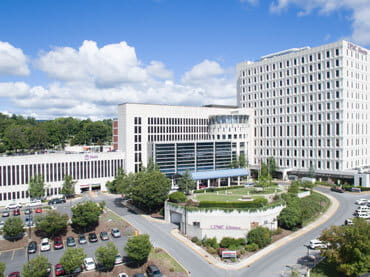The clinical internship at UPMC Altoona begins on or about July 1 each year and runs continuous for 50 weeks. Orientation is held the first week of class. General schedule during the internship year is Monday through Friday from 7 a.m. to 3 p.m. Lectures are held Monday and Thursday from 9 to 11 a.m. and 1 to 3 p.m. The clinical rotations are Tuesday, Wednesday and Friday from 7 a.m. to 3 p.m.
The Medical Laboratory Science Student will study the clinical and diagnostic aspects along with case studies, pre-analytical, analytical and post-analytical components of laboratory services, problem solving, instrumentation, point of care, safety, quality control and quality assurance for the courses listed below.
AH 402 Clinical Chemistry - 8 Credits
Includes the theory and operation of the major classes of instrumentation, the theory and application of the biochemistry, fundamental analytical principles, laboratory calculations, case histories, Enzymology, molecular diagnostics, endocrinology, lipids and lipoproteins, carbohydrates, proteins, tumor markers, electrolytes, ABG's, point of care testing, toxicology, liver function, quality control and quality assurance.
AH 404 Anatomy and Physiology of the Renal System - 2 Credits
Includes renal pathology, routine physical, and chemical tests, sediment examination, and correlation of test results, case histories; also includes examination of other body fluids, feces and quality control.
AH 405 Bacteriology - 6 Credits
Includes morphology, cultural characteristics, case histories, secondary identification, specimen collection, and interpretation of results of gram positive and gram negative cocci, gram positive aerobic and anaerobic rods, enteric and other gram negative rods, mycobacterium, and miscellaneous organisms; also includes media preparation and reagents, quality control, antibiotics and sensitivity testing, epidemiology and viruses.
AH 406 Immunohematology (Blood Bank) - 4 Credits
Blood antigens and antibodies; crossmatching; hemolytic diseases and related diagnostic tests. Also included are donor selection, processing of blood, blood collection, preparation and administration of blood and blood products, case studies, quality control and other general immunohematoloy considerations.
AH 407 Hematology/Coagulation - 6 Credits
Includes the formation, function, enumerative procedures, basic tests, normal and abnormal peripheral blood and bone marrow for the formed elements of the blood, case studies, pathologic states; also includes coagulation theory, special testing and quality control.
AH 409 Medical Parasitology - 1 Credit
Includes the morphology, life cycles, source and collection of specimens, pathological states, various types of parasitic organisms and quality control.
AH 411 Immunoserology - 2 Credits
Includes discussion of natural immunity and immunologic substances, antigen and antibodies, humoral and cellular immunity, complement, autoimmunity, and delayed hypersensitivity; also includes serologic testing for syphilis, non-syphilitic serodiagnostic tests, case studies and quality control.
AH 422 Medical Mycology - 1 Credit
Includes morphology, cultural characteristics, secondary identification, specimen collection, and interpretation of results for yeast, molds yeast like molds, and quality control.
AH 424 Education in Clinical Laboratory Science - 1 Credit
Includes job entry indoctrination, continuing education for laboratory employees, interdepartmental rotation, inservice education and effective mechanisms of teaching.
AH 425 Laboratory Management and Supervision - I Credit
Includes discussions of budgeting, personnel, laboratory space, supplies and equipment, concepts and principals of laboratory operations, general principles of federal and state regulations, laboratory safety, laboratory and hospital information system, ethics and medical/legal matters. Also includes phlebotomy. The primary function of the phlebotomist is to assist the health care team in accurate, safe and reliable collection and transportation of specimens for clinical laboratory analysis.

















